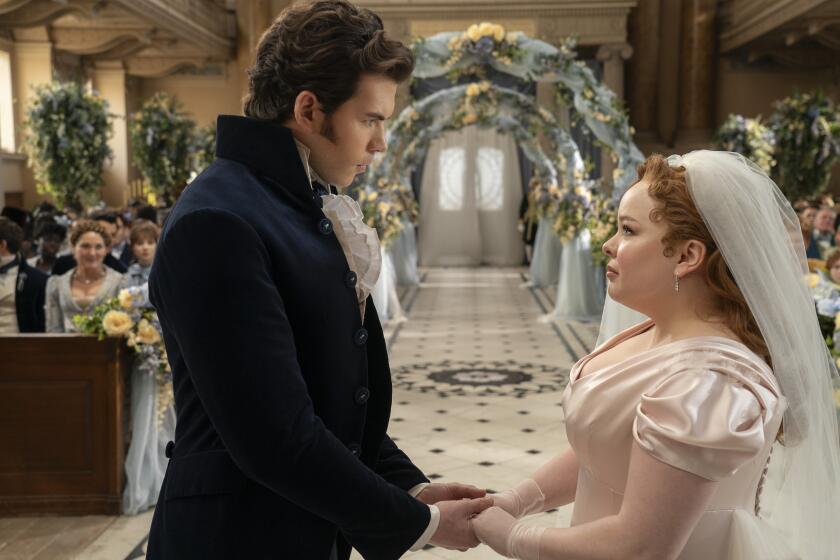Column: Wall Street and high-tech sex harassment scandals offer a lesson for Hollywood: Change won’t happen quickly
The history of gender harassment scandals on Wall Street and in the high-tech world is filled with breakthrough moments.
There are the huge discrimination settlements by big financial firms, including $150 million paid by Smith Barney to settle complaints related to a 1996 lawsuit and $39 million paid by Bank of America in 2013 to settle gender bias claims against its subsidiary Merrill Lynch.
In Silicon Valley, investment executive Ellen Pao lost her 2012 lawsuit against her former employer, the storied venture firm Kleiner Perkins Caufield & Byers, but the case opened many eyes to the systematic exclusion of women from the vast opportunities for advancement and wealth enjoyed by men in the technology world. More recently, the picture of a bro-dominated culture at Uber painted by former Uber engineer Susan J. Fowler contributed to the downfall of its brash co-founder and CEO, Travis Kalanick.
Each of these events produced the impression that things finally would change, what with sunlight finally being shined on pervasive discrimination, harassment, and even assault in the workplace. But those hopes largely have been unfulfilled, and that’s a warning for anyone hoping that disclosures of sexual abuse by Hollywood mogul Harvey Weinstein and others in the entertainment industry will change its abusive culture. The lesson is: Disclosure and sunlight are a start, but real change takes much more.
Moving Harvey Weinstein out is necessary, but not sufficient.
— Ellen Pao, plaintiff in a 2012 discrimination case against venture firm Kleiner Perkins Caufield & Byers
“I’m hoping that more people telling their stories will make a difference, “ Pao told me. “In tech, we went from the idea that tech is a meritocracy and we’re not going to lower the bar [for women], to a much better awareness of what the problem is and an understanding that something is broken. But how you take that and create lasting change is still not clear.” Pao’s memoir of her experience at Kleiner and her lawsuit, “Reset: My Fight for Inclusion and Lasting Change,” was published last month.
For many on Wall Street and in Silicon Valley, change is virtually invisible. In 2010, nearly 15 years after that ostensibly landmark Smith Barney case, Goldman Sachs was hit with a lawsuit alleging that male bankers were rewarded with better pay and promotions than equally accomplished women, and that the atmosphere at the firm was sexually demeaning and even abusive.
Denise Shelley, a former Goldman trader, asserted in a court declaration that it was common for men on the trading floor to deride their female colleagues as “bimbos,” and that the atmosphere at Goldman “sexualized women in a way that made it difficult for us to be taken seriously as professional peers.” Goldman has sought to have the case thrown out on technical grounds.
Better opportunities for males means more success, creating a positive feedback loop: “Good producers” tend to be arrogant and entitled, and also immunized from discipline. “The rainmakers don’t get fired, ever, for bad behavior,” says Maureen Sherry, a former managing director at Bear Stearns & Co. who turned her experiences on the trading floor into a comic novel published last year, “Opening Belle.” (She’s currently working on the screenplay.)
Fowler witnessed this effect firsthand at Uber when she reported a manager who turned out to be a serial sexual harasser. “Upper management told me that he ‘was a high performer,’” she wrote, “and they wouldn’t feel comfortable punishing him for what was probably just an innocent mistake on his part.”
Veterans of workplace discrimination battles say the problems are cultural, not episodic: Unless the general atmosphere in a company or industry is changed, then individual cases of abuse will continue to bubble up, and they’ll always be the tip of the iceberg. That means creating a diverse management, with more women and people of color. But that’s difficult, since dominant cultures tend to be self-perpetuating.
“When you have a boardroom full of mature, Caucasian gentlemen, their network will consist of people like them, and they’ll tend to invite people like them onto the board,” says Sallie Krawcheck, a former top executive at Smith Barney and Merrill Lynch. Male monocultures, like any others, tend to set their own insular standards of behavior — in the case of what she witnessed, “a culture of toxic masculinity.”
“How do you react when you’re a young banker, hunched over a colleague’s spreadsheet to help him work through a sticky math problem, and there’s another guy behind you pretending to perform a sex act on you?” Krawchek remarked in an article last year at xojane.com. Her solution: “I put my head down and worked while some of the guys were clowning around.”
While this proved to be Krawchek’s path to success, the general trend in corporate America has been stagnant. A survey published last year in the Harvard Business Review by two partners in the business consultancy Oliver Wyman found that among 50 American financial services firms, “women occupy only 20% of executive committee roles and 22% of board positions” and “only 12% of the chief executive officers of large U.S. financial firms are women.”
“What you’ve seen,” says Krawchek, who has founded Ellevest, an online platform for women investors, “is not a great deal of progress over the past decade.”
The same is true in the tech industry, even though Silicon Valley companies have been under the gun for years to redress a gross imbalance between men and women in their professional ranks. Apple reports that its technology workforce evolved from 80% to 77% male from 2014 through 2016, though its leadership ranks remained stuck at 77% male through that entire period. At Facebook, the technology staff is 85% male.
If there’s a hopeful sign for women in the workplace in the surge of publicity about sexual harassment and assault in Hollywood, it’s the erosion of the long-standing pressures for silence that have prevailed for decades. On Wall Street and in Silicon Valley, where harassment typically plays out within the employer-employee relationship, silence has been enforced through mandatory arbitration of workplace complaints.
“Mandatory arbitration is at the core of so many of these problems,” says Susan Antilla, the author of “Tales from the Boom-Boom Room,” a 2002 book about the Smith Barney lawsuit and other Wall Street discrimination cases of that era. (The “Boom Boom Room” was the party room at the Long Island branch office of Shearson Lehman Bros., which later merged with Smith Barney.)
But there also has been intense pressure on women not to speak out, whether to protect the careers of their abusers, protect their own prospects for advancement, or to avoid shame and stigma. “Women like me were ‘team players,’” Sherry recalled recently. “Like members of a dysfunctional family, we kept our secrets to ourselves.”
That’s a reminder that gender discrimination is an expression not merely of sexual will, but power. The women who accuse Harvey Weinstein of harassment and assault often were actresses at the beginning of their careers, dealing with a man at the pinnacle of the entertainment industry with the power to make their future or consign them to oblivion. As my colleague James Rufus Koren has reported, men in such powerful positions — Weinstein, former Fox News chief Roger Ailes and on-screen personality Bill O’Reilly — have been able to settle those allegations with payoffs conditioned on nondisclosure agreements, creating a “silencing culture” in Hollywood.
Yet not only have individual women been victimized, but the industries themselves have been hobbled by the blinkered attitudes fostered by their lack of diversity.
Fans of the Amazon TV show “Good Girls Revolt,” a potential breakout hit about workplace discrimination in the 1960s, have observed that the Amazon Studios head who pulled the plug, Roy Price, resigned this month after being accused of sexual harassment by a female producer on a different Amazon show.
The breakdown of the culture of silence over gender abuse in the workplace, especially in Hollywood, has produced a remarkable surge of public awareness.
“Sunlight has illuminated the problem,” says Pao. “Now people need to do the hard work to fix it, and it’s not a simple fix. Moving Harvey Weinstein out is necessary, but not sufficient.”
Keep up to date with Michael Hiltzik. Follow @hiltzikm on Twitter, see his Facebook page, or email michael.hiltzik@latimes.com.
Return to Michael Hiltzik’s blog.
More to Read
The biggest entertainment stories
Get our big stories about Hollywood, film, television, music, arts, culture and more right in your inbox as soon as they publish.
You may occasionally receive promotional content from the Los Angeles Times.







